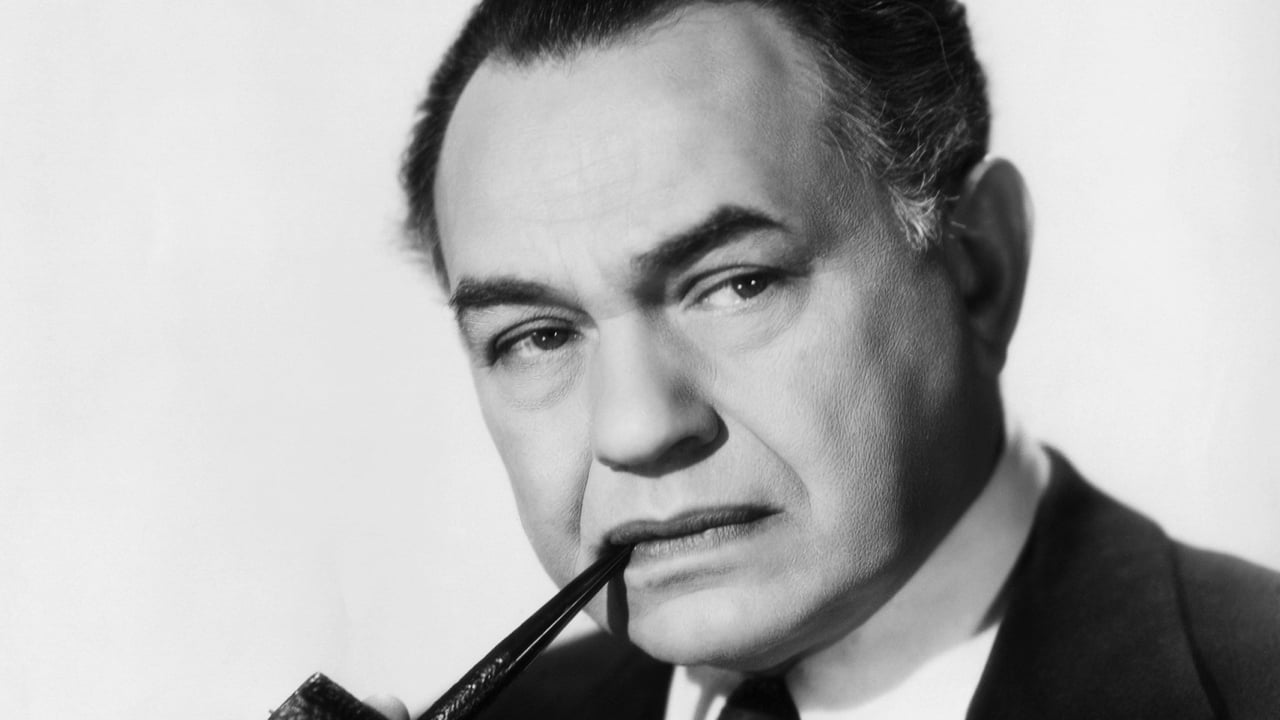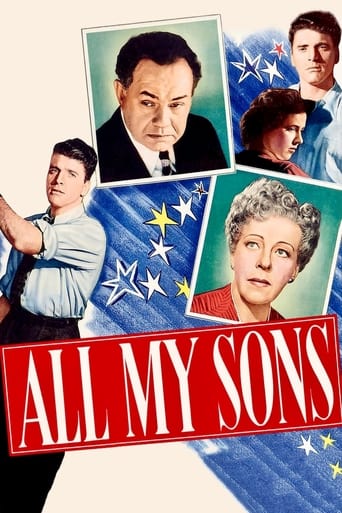Rio Hayward
All of these films share one commonality, that being a kind of emotional center that humanizes a cast of monsters.
Raymond Sierra
The film may be flawed, but its message is not.
Jerrie
It's a good bad... and worth a popcorn matinée. While it's easy to lament what could have been...
Cristal
The movie really just wants to entertain people.
Lee Eisenberg
Irving Reis's "All My Sons" is based on one of Arthur Miller's lesser known plays, but I would call it just as important as "Death of a Salesman" or "The Crucible". Edward G. Robinson's businessman is the embodiment of evil. It's easy to see this as a one-time story, but it has repeatedly happened. From insufficiently armored Humvees in Iraq to peanut butter tainted with listeria (when the CEO knew that it was), these stories are a rebuttal to all who rail against regulations. Regulations exist to keep society safe: building codes, speed limits, etc. The idea that the market will solve everything results in the sale of dangerous products and the refusal to maintain infrastructure, leading to bridges collapsing. Does the relative of a celebrity have to get killed in a collapsing bridge before we fix our infrastructure?Anyway, this is a good movie. Everyone should see it. No surprise that many of the performers faced HUAC.
bkoganbing
All My Sons was Arthur Miller's second produced play and first commercial success winning Tony Awards for Best play, a Tony for stage director Elia Kazan and a run of 347 performances for the year of 1947. But when the film version was made the following year the House Un- American Activities Committee was taking a long hard look at All My Sons and all who were associated with it.Universal Studios which produced the film version did more than just expand a play that had a one set setting on stage, that set being the backyard of the Keller family. A whole lot of references to the capitalist system built on greed and the notion of anything for a profit were carefully eliminated. Miller's protagonist Joe Keller becomes a monstrous aberation as opposed to a symbol. That being said the adaption by Chester Erskine is still a fine drama with the polemics trimmed.Taking over from Ed Begley who did the role on stage is Edward G. Robinson as Joe Keller the owner of a factory which had shipped some bad engine parts for airplanes and caused the crash of several of them. Robinson managed to skate responsibility and the blame fell on his partner Frank Conroy who is now in prison. Incidentally one of the changes is that on stage Conroy's character is never seen only talked about. Here Burt Lancaster as Robinson's surviving son has a new scene with Conroy visiting him in prison to learn the truth about his father as doubts of his innocence have crept into his mind.The House UnAmerican Activities Committee was all over this work in their glory days of 1948. Arthur Miller was blacklisted, so was Mady Christians who played Mrs. Keller. Elia Kazan as we know turned friendly witness for the hounds of HUAC and Edward G. Robinson in the Fifties was what was termed 'gray listed'. Not forbidden to work per se, but studios were not giving A budget work any more and wouldn't until Cecil B. DeMille hired him for The Ten Commandments.In the end Robinson has to take responsibility for what he did and he does it in the most dramatic way possible. Aficionados of Arthur Miller's work will note the similarities between the Keller and the Loman families in Miller's next production Death Of A Salesman.Possibly one day we'll get another film version that is more true to what Arthur Miller had in mind. This will due until that happens.
Edgar Allan Pooh
. . . remain the five most bittersweet words in Illinois history, so it's natural for playwright Arthur Miller to set ALL MY SONS in the Land of Lincoln, and name his main character so he can rephrase "Shoeless" Joe Jackson's Black Sox Scandal epitaph as, "If you want to know, just ask Joe." Mr. Miller did not believe in the American Way (which is the main reason that his wife, Marilyn Monroe, dumped him). Arty campaigned against our credo, "See something, say something" with his hysterical story, THE CRUCIBLE. He denigrated the American Way (Amway, for short) which recognizes that "You cannot have your One Per Cent of Big Winners without enduring whining from the 99% of Deluded Losers" with his DEATH OF A SALESMAN "Willie Loman" character. Most glaringly, here in ALL MY SONS, it never crosses the mind of war profiteer "Joe Keller" to fix his warplane faulty cylinder peccadillo the C of C way, by making substantial "campaign contribution" bribes to the Party of Lincoln. Had he written off the cost of doing business with a well-placed $500 here and a thousand there, his patsy partner Herb Deever never would have been indicted in the first place. There would have been no scandal (and NO play or movie, either!). Pinko fellow traveler Arty's sad tales all rely upon his near-total ignorance of the American Way.
denscul
Arthur Miller is one of our best authors. His play however reeks of a bias, that makes him seem ignorant of his own times. Without Industry, and the profit system, the US would not have won WWII. Rubber was one of those items needed to fight a modern war. And it was the "war profiters" who provided our nation with synthetic rubber. If your too young to remember, ask your grandfather or Dad about the rubber shortage. If a writer wants to focus on immorality, why don't they start at the top, and blame those politicians and propagandists who get us into wars. Watch nearly every movie made from 1939 until 1945, and you will see what Playboy magazine called "Hollywood Go to War."People of German, Italian and Japanesse decent were racially and ethnically played in the worst possible way, and any artist worth his salt would agree that even a movie as great as Casablanca had its share of propaganda.Miller and Chester Erskine, who adapted Miller's play seemed an illogical indictment of anyone who made a profit during the war.Aircraft pistons are one part of an Aircraft. They are less likely to fail than compression rings, rods, bearings, electrical and hydraulic parts. Losing one piston, does not usually cause crashes.Writers may be clever about how they write, but they can sound awfully stupid writing dialog that has Joe Keller stating that he "beat an old stove up for scrap." Scrap is sold by the pound, not by condition.More importantly, both writers seem to be totally ignorant of the government and manufacturer's inspection systems. Manufactures would not accept "junk" material from a subcontractor. As aircraft are put together, each manufacturer assumes liability for the pieces they build. More than the Federal inspectors, they would not risk their contracts by routinely and criminally accepting faulty pistons. Miller and Erskine conveniently overlook that logic and fact, and concentrate on one character who probably would have been caught before the piston ever found its way into an aircraft.Before the aircraft was accepted by the military, it would be flown to its maximum performance standards. The military would also fly the aircraft in a test flight before sending it into combat. The failure of one piston, in an engine would not usually bring an aircraft down. This is particularly true of multi-engine aircraft. And perfectly good pistons have been known to break down occasionally. Producing perfectly good pistons that break is not a crime or immoral. Proving that a faulty piston caused 29 accidents, and was a crime, is legal fantasy.There may have been a million pistons produced in WWII. The sheer number makes it likely that some perfectly good pistons failed.Miller's and Erskine's play and film script becomes a tall tale to weave its "moral" failings of one man, or the industries that produced "The Arsenal" of Democracy.From the lowest person who pushed a broom, to the very capable men who made millions, Miller's seemed to go out of its way to indict the industry that provided the arms for the the millions in uniform. I would be foolish to defend the rotten apples, cowards, stupid mistakes, and expediencies which cost lives. It just makes me wonder why Miller picked on one piston manufacturer to make his clumsy points. I recall a line in the film dialog, where Joe Keller stated that he had been arrested and spent some time in jail, and the jury declared him innocent. Did Miller or Erskine ever attend a real criminal trial? Does he know what it takes to convict anyone in this country? Convincing a jury that a batch of bad pistons among millions caused 29 crashes goes beyond any real concept of the trail system.Why did Miller pick a fight with the men who made profits during the war? His play shows his contempt for such men, the film version softened his personal views.The film ignores some basic facts. A public trial opens up an opportunity for all sorts facts and evidence to surface. More importantly, since Joe Keller was acquitted, he could not be charged again. As the film opens, his reputation is already an open question with some in his circle of friends, and should have been fixed during the time the film opens. Neither Miller nor Erskine inject any new information into Keller's guilt or innocence. Whether Keller was sick or not on the day the "faulty" pistons were shipped, in any ordinary trial would have been investigated and regurgitated by Keller's defense team. Keller's statement at the dinner table, that" he had never been sick a day in his life" has as much resonance as the comments all men make at times, such as "I would have killed him".Miller doesn't know anything about American combat pilots. They were not inclined to go on suicide missions due to defects in family or friends.Miller should have written what it was like to have survived as a combat crew-member during the war. Or the moral anguish that officers had over sending men to their death. especially when mistakes were made. Did they have a moral struggle to admit they cost innocent lives?Miller's play is a fiction that goes beyond "literary license" and to this film lover, seems to be an effort at politics, rather than a morality play.I still do not understand the purpose for creating a character like Kate Keller. Anyone who continued to think her son was still alive three years after the war does not seem to be a stable person and more likely to commit suicide than the character of Joe Keller.

